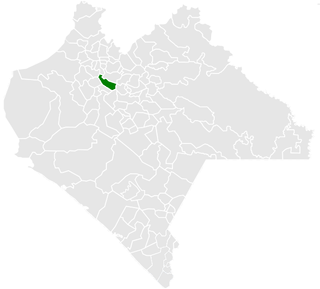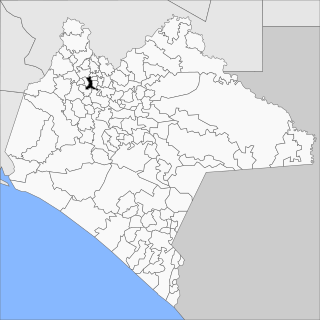Related Research Articles

Chiapas, officially the Free and Sovereign State of Chiapas, is one of the states that make up the 32 federal entities of Mexico. It comprises 124 municipalities as of September 2017 and its capital and largest city is Tuxtla Gutiérrez. Other important population centers in Chiapas include Ocosingo, Tapachula, San Cristóbal de las Casas, Comitán, and Arriaga. Chiapas is the southernmost state in Mexico, and it borders the states of Oaxaca to the west, Veracruz to the northwest, and Tabasco to the north, and the Petén, Quiché, Huehuetenango, and San Marcos departments of Guatemala to the east and southeast. Chiapas has a significant coastline on the Pacific Ocean to the southwest.

Tuxtla Gutiérrez, or Tuxtla, is the capital and the largest city of the Mexican southeastern state of Chiapas. It is the seat of the municipality of the same name, which the most developed and populous in the state. A busy government, commercial and services-oriented city, Tuxtla had one of the fastest-growing rates in Mexico over the last 40 years. Unlike many other areas in Chiapas, it is not a major tourist attraction, but a transportation hub for tourists coming into the state, with a large airport and a bus terminal.
Tojol-ab'al is a Mayan language spoken in Chiapas, Mexico by the Tojolabal people. Tojol-ab'al is spoken, principally in the departments of the Chiapanecan Colonia of Las Margaritas, by about 70,000 people. It is related to the Chuj language.

Robinsonella is a genus of flowering plants in the family Malvaceae. It contains sixteen species of trees occurring from Costa Rica to southern Mexico, eight of which occur in the Mexican state of Chiapas.

XEVFS-AM is an indigenous community radio station that broadcasts in Spanish, Tojolabal, Mam, Tseltal, Tsotsil and Popti from Las Margaritas in the Mexican state of Chiapas. It is run by the Cultural Indigenist Broadcasting System (SRCI) of the National Institute of Indigenous Peoples (INPI).

Villaflores is a municipality in the southern Mexican state of Chiapas, and the name of its largest settlement and seat of the municipal government. Situated in the Sierra Madre de Chiapas range, the municipality has an area of approximately 1232 km2 at an average elevation of 540m above mean sea level.

Bochil is a city and municipality in the Mexican state of Chiapas, in southern Mexico. It covers an area of 372.7 km². Bochil serves as the head town for the Second Federal Electoral District of Chiapas.

Escuintla is a town and municipality in the Mexican state of Chiapas, in southern Mexico. It covers an area of 206.2 km2.

Socoltenango is a town and municipality in the Mexican state of Chiapas in southern Mexico.

Teopisca is a town and municipality in the Mexican state of Chiapas in southern Mexico.

Ocotepec is a town and municipality in the Mexican state of Chiapas in southern Mexico.

Pantepec is a town and municipality in the Mexican state of Chiapas in southern Mexico. The Chiapas Zoque language is spoken in this municipality.

Sabanilla is a town and municipality in the Mexican state of Chiapas in southern Mexico.

Reforma is a city and municipality in the Mexican state of Chiapas in southern Mexico.

Tapilula is a town and municipality in the Mexican state of Chiapas in southern Mexico.

Unión Juárez is a town and municipality in the Mexican state of Chiapas in southern Mexico. The majority of the population in the municipality is Mam people that preserves the Mam traditions and Mam language.
Radio Insurgente is the official voice of the Zapatista Army of National Liberation (EZLN).The radio station has been operating since August 2003 and it is independent from the Mexican government. Its broadcasting location is unknown. Radio Insurgente's content is focused on promoting the ideas and struggles of the Zapatista movement. Radio Insugente transmits programs in Spanish and in the indigenous languages Tzotzil, Tzeltal, Chol and Tojolabal. According to their websiteArchived 2005-04-04 at the Wayback Machine, they transmit "from various places in Chiapas directed to the Zapatista bases, the insurgentes and milicians, the commanders and local people in general". No new programs have been posted on the website since 2009, but CDs are on sale on the site and users can listen to previous content.
The Qʼanjobalan a.k.a. Kanjobalan–Chujean languages are a branch of the Mayan family of Mexico and Guatemala. All Q'anjobalan languages are spoken in Chiapas, Mexico, four languages of the branch are spoken in Huehuetenango, Guatemala.
The Spanish conquest of Chiapas was the campaign undertaken by the Spanish conquistadores against the Late Postclassic Mesoamerican polities in the territory that is now incorporated into the modern Mexican state of Chiapas. The region is physically diverse, featuring a number of highland areas, including the Sierra Madre de Chiapas and the Montañas Centrales, a southern littoral plain known as Soconusco and a central depression formed by the drainage of the Grijalva River.

Kʼatepan, also known as Yolchonabʼ, is an archaeological site of the ancient Maya civilization located 1 kilometre (0.62 mi) to the east of the modern town of San Mateo Ixtatán, in the Huehuetenango Department of Guatemala. The name Kʼatepan translates as "old church", while the alternate name of Yolchonabʼ means "in the village". The site consists of a small temple plaza in front of two large terraces set against a mountainside, accessed by broad stairways. The site was first described by Guatemalan historian Adrián Recinos in 1913. Recinos considered Kʼatepan to be the most important ceremonial site in the northern Sierra de los Cuchumatanes mountains. A preliminary map of Kʼatepan was produced in 2007.
References
- ↑ "Tojolabal | people".
- ↑ dice.missouri.edu/docs/mayan/Tojolabal.pdf